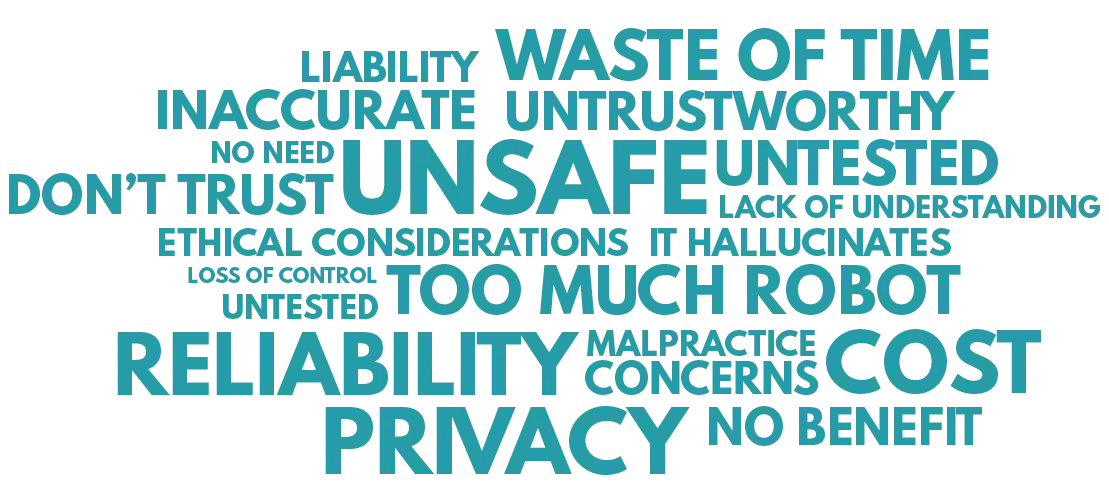2 min read
Data Security and All the Other Lawyers
During a presentation at the ABA’s 44th National Conference of Professional Responsibility last year, a CLE panelist threw out the following. Given...
We've crafted solutions tailored to your firm
The world of insurance for law firms can be confusing, and difficult to navigate. We've created this glossary because these common insurance terms should be easy to understand.
3 min read
 Mark Bassingthwaighte, Risk Manager
:
Updated on November 5, 2024 | Posted on October 17, 2024
Mark Bassingthwaighte, Risk Manager
:
Updated on November 5, 2024 | Posted on October 17, 2024

ALPS recently surveyed legal industry professionals to learn more about how solo and small firm lawyers feel about the use of generative AI in the practice of law. We thought it would be fun to share their responses along with a concluding summary of takeaways. The "TLDR" is that while most private practitioners remain wary of the risks surrounding certain applications of generative AI, this tool is also a fantastic resource for small firms, when used appropriately. If, after reviewing these results, you feel compelled to reach out, please do so, or even comment on this post! We'd love to hear your thoughts as well. Now on to the results.
Q. 1 - Are you currently using AI in your day-to-day business?
A. 1 - 80% of our respondents reported no.
Q. 2 - Which AI tool(s) are you using?
A. 2 - Of the 20% of respondents who are currently using AI tools, 72% of them reported they were using the publicly available generative tools ChatGPT, Gemini, and/or Copilot and 55% reported using the specialized generative AI tool Westlaw Edge, Lexis+ AI, or CoCounsel.
Q. 3 - If you are not currently using AI, or have limited your use, what is keeping you from using AI?
A. 3 - The overwhelming majority of respondents expressed concerns with the accuracy and reliability of the output (the hallucination problem) or with the privacy and security of the tool. Two notable additional reasons shared included no perceived need for these tools and no idea how to use them. Here is a word cloud covering a number of responses.

Q. 4 - How strongly are you considering using AI in the future?
A. 4 - 49% reported no current plans to adopt, 28% are interested in using it but waiting for legal acceptance, 16% are researching its usage possibilities, and 7% plan on adopting it within the next year.
Q. 5 - What is your review process for AI-generated content?
A. 5 - Of those who are currently using generative AI, only one reported just running with the output. Everyone else reported varying degrees of review with the majority taking the time to thoroughly review the output, to include checking any and all citations (a trust but verify process).
Q. 6 - What threats do you foresee arising from using AI in your practice?
A. 6 - While the majority of answers to this question focused on ethical and malpractice missteps (inaccurate outputs, data privacy, and undue reliance), there were a few outliers that ran the gamut. Representative quotes include “The list is endless;” “It’ll take over the world like that one movie;” “Lack of accountability and the dumbing down of the industry;” and one that I thought was most interesting, “None.” We included a word cloud with some of the most popular responses.

Q. 7 - Do you think the legal industry is prepared to adopt AI?
A. 7 - 77% of respondents thought no.
Q. 8 - What are your concerns about using generative AI in the legal industry?
A. 8 - (Note that respondents could select more than one answer from a list of concerns.) In decreasing order, the concerns respondents found most troubling were:
Ethical Considerations 85%
Output Accuracy 81%
Legal Compliance 67%
Data Security/Privacy 62%
Job Displacement 27%
Not Applicable 02%
I Don’t Have Any Concerns 01%
Q. 9 - Do you think AI has the potential to replace paralegals?
A. 9 - 32% of respondents said yes.
Q. 10 - How soon do you think AI will replace paralegals?
A. 10 - Of those who felt AI has the potential to replace paralegals, no one felt this would happen within the next year, 59% feel this will happen in the next 2 to 5 years, 33% think it will take 6 to 10 years, and 2% think it will be 10+ years.
Q. 11 - Do you think AI has the potential to replace lawyers?
A. 11 - Here our respondents seemed to be a bit more optimistic with only 21% saying yes.
Q. 12 - How soon do you think AI will replace lawyers?
A. 12 - For those who think their days are numbered, 6% think this will happen within a year, 50% think it will take 2 to 5 years, 33% think it will take 6 to 10 years, and 11% think it will be 10+ years.

Q. 13 - Should any organizations be responsible for regulating, or coming up with standards, for the use of AI within law firms?
A. 13 - 86% of the respondents said yes.
Q. 14 - Which organizations do you think should be responsible for regulating, or coming up with standards, for the use of AI within law firms? (Choose all that apply)
A. 14 – State Bar Associations 73%
The ABA 54%
Practice Area-specific Associations (i.e. Trial Lawyers Assoc.) 21%
It should be up to the firm to monitor 19%
Local bar Associations 12%
None 11%
As I reflect on the results of this survey, they seem to suggest that most solo and small firm lawyers are approaching the use of generative AI with an air of caution and concern. And while an entirely appropriate response, I hope the concerns they expressed don’t turn into an excuse to try to completely avoid using generative AI. Of course, as generative AI becomes ever more integrated into the practice just like other technologies have been, trying to do so will become ever more problematic. That said, I’d like to share a final thought in the form of a quote from one of our respondents. I found this to be a voice of reason.
“Think of AI as like Lexis or Westlaw when they started offering digital libraries, or registries when they went online with their data. These are tools that make the practice of law better, but they are not a replacement for attorneys or the attorney mind. … AI is not entirely understood at this time, but being well versed and educated at the forefront of this emerging technology can give lawyers an edge that they otherwise would not have, (an ability to) compete with larger firms.”
I couldn’t agree more.
Mark Bassingthwaighte, Esq., serves as Risk Manager at ALPS, a leading provider of insurance and risk management solutions for law firms. Since joining ALPS in 1998, Mark has worked with more than 1200 law firms nationwide, helping attorneys identify vulnerabilities, strengthen firm operations, and reduce professional liability risks. He has presented over 700 continuing legal education (CLE) seminars across the United States and written extensively on the topics of risk management, legal ethics, and cyber security. A trusted voice in the legal community, Mark is a member of the State Bar of Montana and the American Bar Association and holds a J.D. from Drake University Law School. His mission is to help attorneys build safer, more resilient practices in a rapidly evolving legal environment.

2 min read
During a presentation at the ABA’s 44th National Conference of Professional Responsibility last year, a CLE panelist threw out the following. Given...

2 min read
In the good old days, plaintiff lawyers hoping to find a few new clients would place ads on billboards located near hospitals. From an ethical...

15 min read
On this special Valentine’s Day episode of ALPS In Brief, Mark sits down with Joshua Lenon, lawyer in residence and data protection officer for Clio